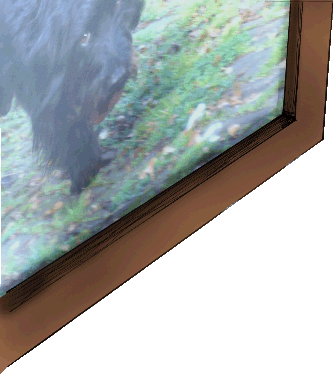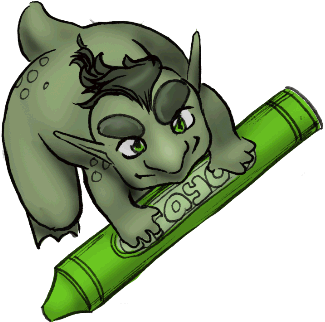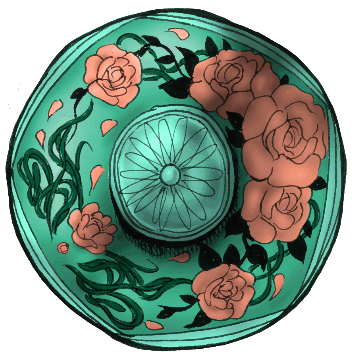What if? Ah, what if we were all the same, really…
Blog EntriesPosted for New Zealand Speculative Fiction Blogging Week.
Elf M Sternberg recently blogged a quote from Keith Johnstone’s book Impro: Improvisation and the Theater that, like so much of what Elfs observes about writing, resonated with me:
Writer’s block is never because you cannot come up with an idea. Writer’s block is when the story that wants to come out is blocked by the part of you anxious that it will be too personal and will reveal the truth: that you, like everyone else, are not quite so sane and secure as you pretend.
Speculative Fiction has sometimes been defined as fiction that poses a “what if” question. I personally believe that most fiction does this. However, the what ifs of speculative fiction come in the form of monsters, boogie men, magic, magically advanced technology, and The Other; alien races and alien worlds whether they exist in space or on the flip side of a metaphysical or moral veil. They are what ifs drawn from outside usual human experience even if the definition of what is usual is stretched. Writers of speculative fiction enjoy (or perhaps suffer through) the experience of taking themselves far out onto experiential limbs and rather discarding the boundaries imposed by commonplace notions of sane or secure. After all, in sane and secure worlds adults tend to agree faeries don’t exist, alien life forms are pure unscientific conjecture, and we live in fear of the human monsters stalking about in our inner and outer worlds. Perhaps this is why horror, sci-fi and fantasy have been grouped together under the slightly unwieldy label of Speculative Fiction. Perhaps, by writing our way into these realms we partake a little of them, and take on our own scary magic, and the mystique of night terrors ourselves. Possibly, we are the literary Other.
Children’s and Young Adult authors have traditionally been exempt from being tarred (or gilded) with this brush. Writing for youth gives you a sort of get out of jail free card against being labeled as a fantasy author, certainly, and this holds true even if you are reckless enough to include a dragon or two in your books. Children’s storys are _meant_ to be fairy tales, and fairy tales are literary, and respectable cultural artifacts. Growing minds should be provided with richly imaginative writing that takes them on long journeys into unusual places. Somehow, on entry to adulthood such exploration becomes less socially sanctioned and the need for the mind to grow and to experience wonder is often funneled into other directions, or neglected. The need to pretend to be as sane and secure as everyone else is suggested by anything asking for conformity, anything asking us to leave our fairy tales and imaginings behind, and to disbelieve in magic of any sort.
I see no reason, however, to subscribe to any cultural cringe around writing or reading Speculative Fiction. All authors of fiction necessarily take the journey of imagining. We all fasten our seat belts, make sure our tray tables are stowed in an upright position, and our hands are inside the vehicle at all times as we take off. This is true whether our destination is inside the head of a girl in Bougainville or inside the head of a girl Somewhere Else. Regardless of genre, we use the same magic and technology to write, and show similar variations in how skilfully we deploy our writing tools. Of course writers of speculative fiction are literary. Margaret Mahy, Keri Hulme, Elizabeth Knox, and Maurice Gee are local literary writers of Speculative Fiction. Speculative fiction has noble roots in New Zealand, dating at least as far back as Samuel Butler’s Erewhon (1872), with the many Speculative Fiction publications that predate the existence of the term including Science Fiction by Sir Julius Vogel (the former Prime Minister published Anno Domini 2000: A Woman’s Destiny in 1889). There is no merit based cause for us to have less pride or recognition than our brethren making Sci-fi and fantasy in the film industry.
So why use the label ‘Speculative Fiction’? Ever reliable Wikipedia tells us that Speculative Fiction overlaps one or more of “science fiction, fantasy fiction, horror fiction, supernatural fiction, superhero fiction, utopian and dystopian fiction, apocalyptic and post-apocalyptic fiction, and alternate history.” Wikipedia also reports that the term was used by Robert Heinlein in 1947 as a synonym for Science Fiction and that it gained currency as a pejorative term for books in the aforementioned genres in the 1960s and ’70s.
Currently, the three genres of Fantasy, Sci-fi and Horror seem to live under this umbrella. It has become a useful shelter for authors who write similar things to nestle under and for collectors of anthologies, or publishers, to search for new talent under. Strength and respectability seem to come with banding together under that label and it has provided a wonderful rallying point for the many people who enjoy reading these genres. Now any fiction that has an element of these genres mixed in with other genres attracts the title of interstitial fiction or slipstream. For example, we have Nalini Singh, a writer of Paranormal Romance. A huge crop of new slipstream mixed genre writing is emerging. Trying to clearly label many of these multi-genre works is sometimes an exercise in futility. It increasingly seems that the use of such labels as Speculative Fiction or Slipstream is going to be as a touchstone for mutual recognition rather than for the purposes of division from ‘mainstream’ non fiction or as a clear-cut identifier. I am watching with enthusiastic curiosity to see where this rather wonderful open – endedness takes us.




September 19th, 2009 at 5:28 pm
Great Post.
Thanks for joining us in NZ SpecFic Blogging week.
Ripley
September 19th, 2009 at 5:42 pm
Thanks Ripley! I’ve been enjoying your blog for a long time – its great to have you drop by!
September 20th, 2009 at 8:08 am
Fantastic post. I agree wholeheartedly with your points and the blurring of genre/literary/slipstream boundaries. It’s a great time to be a writer and reader of fiction.
September 20th, 2009 at 9:47 am
What a great post, excellent reading!
September 20th, 2009 at 11:47 pm
Thanks Cassie and Debbie! 🙂
March 14th, 2010 at 6:21 am
I enjoyed reading your interesting yet very informative insights. I just love reading anything about eye-catching articles. Thank you for sharing and I am looking forward to reading your newest and most recent masterpieces!!! – Fairy